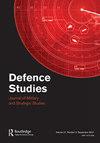Still fit for purpose? Reassessing and revising NATO’s core tasks
Q1 Arts and Humanities
引用次数: 1
Abstract
ABSTRACT NATO’s 2010 Strategic Concept established three core tasks for the Alliance: collective defense, crisis management, and cooperative security. While those tasks remain sound, the 2010 Concept reflected a different geopolitical, geostrategic, and security environment from today’s, characterized by renewed conflict with Russia, concerns about China’s strategic and economic ambitions, and new security challenges like hybrid threats and disinformation. Considering the changed strategic landscape and emerging challenges, we argue that NATO should make several refinements to its core tasks. European Allies must improve defense capabilities, ensuring their ability to help NATO meet its core tasks. In conjunction with the other Allied nuclear powers (the United Kingdom and France), the U.S. must renew its commitment to maintaining NATO as a nuclear alliance. NATO should adopt a more rigorous operational definition of crisis management, and a more systematic emphasis on the early warning and pre-crisis phases. Finally, while national “resilience” is already implied in Article 3ʹs requirement for member states to “maintain and develop their individual and collective capacity to resist armed attack,” adding it as a fourth core task would powerfully emphasize the need for allies to address new elements of resilience, to include both technological threats and democratic backsliding.仍然符合目的吗?重新评估和修改北约的核心任务
北约2010年战略构想为北约确立了三项核心任务:集体防御、危机管理和合作安全。虽然这些任务仍然很好,但2010年的概念反映了与今天不同的地缘政治、地缘战略和安全环境,其特点是与俄罗斯的冲突再次爆发,对中国战略和经济野心的担忧,以及混合威胁和虚假信息等新的安全挑战。考虑到战略格局的变化和新出现的挑战,我们认为北约应该对其核心任务进行一些改进。欧洲盟国必须提高防御能力,确保他们有能力帮助北约完成其核心任务。美国必须与其他盟国(英国和法国)一道,重申其维持北约核联盟的承诺。北约应对危机管理采取更严格的行动定义,并更系统地强调预警和危机前阶段。最后,尽管第3条要求成员国“保持和发展抵御武装袭击的个人和集体能力”,已经隐含了国家的“韧性”,但将其作为第四项核心任务,将有力地强调盟友需要应对韧性的新要素,包括技术威胁和民主倒退。
本文章由计算机程序翻译,如有差异,请以英文原文为准。
求助全文
约1分钟内获得全文
求助全文

 求助内容:
求助内容: 应助结果提醒方式:
应助结果提醒方式:


